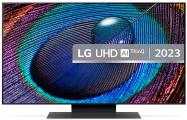Add devices to your profile, rate and comment on your smartphones...
Price comparison
Prices
In 5 stores
- 55"4KHDRG
- 124 cm72 cm5.8 cm
- LCD LED Edge LED VA
- -- nits --:1
- Total 20 W 2 x 10W
- DVB-TDVB-T2
- webOS 22
LG UR91 specs: Technical sheet
Brand
Release Date
- Year
- 2023
LG UR91 prices
Related
- Predecessor
Image
LCD LED
- BacklightEdge LEDEdge LED lighting illuminates the panel from the sides with worse light distribution
- TechnologyVAVA technology allows a greater contrast than an IPS, against losing slightly in viewing angle
- ColorimetryRGB filterThe RGB filter is found on all televisions and allows you to generate the three RGB colors
- CrystalAnti-glare filterReduce direct light reflections
- Reference imageFinal imageGoodGood choice for normal use, if you don't need pure blacks
Size (inches) and resolution
- Diagonal
- 55 inches
- Resolution
- 4K • 3840 x 2160
- Aspect ratio
- 16:9
- Pixel density
- 80 ppi
Technology
- Panel type
- LCD
- LCD technology
- VA
- Subpixel type
- RGB
- Refresh rate
- 60 Hz
- Panel Manufacturer
- --
Backlight and contrast
- Backlight type
- LED
- Backlight form
- Edge LED
- Brightness
- -- nits
- Contrast
- --:1
- Light sensor
- No
Colorimetry
- Quantum Dots
- No
- Color spaces
- Rec. 709
- 100%
- DCI P3
- --
- NTSC 1953
- --
- Rec. 2020
- --
- sRGB
- --
- Color depth
- 10 bits (8 bits + FRC)
HDR
- Tradename
- Active HDR
- HDR technologies
- HLG
Crystal
- Anti-glare filter
- Yes • Anti-reflective filter
Processing
These features modify the images received by television via software, in many cases they create unwanted artifacts, we disable some of them, but here you have them ...
- Image processor
- LG ThinQ AI
- Fake HDR
- Active HDR, HDR Dynamic Tone Mapping
Response times
- Minimum time
- --
- Average time
- --
- Input lag
- 11 ms
- Gaming
- --
Sound
Speakers
- Speakers
- 10W 2x
- Power
- 20 W
- Output channels
- 2.0 CH
Sound technologies
- Technologies
- Dolby Digital
Tuner and connectivity
Digital tuner
DVB
- Terrestrial
- DVB-T
- DVB-T2
- Satellite
- DVB-S
- DVB-S2
- Cable
- DVB-C
- ATSC & QAM
- No
- ISDB
- No
- DTMB
- No
Analog tuner
- NTSC
- Yes
- PAL
- Yes
- SECAM
- Yes
Hybrid television
- HbbTV
- No
Cable connections
- RF antenna
- Antenna (RF) 1x
- HDMI
- HDMI 2.1 2x
- HDMI 2.0 2x
- HDCP 2.3
- USB
- USB 2.0 2x
- Satellite
- Satellite In (F-type female) 1x
- Optical Audio
- Optical Audio Out 1x
- Ethernet
- Ethernet RJ45 1x
- Unknown
- CI+ 2.0 1x
Wireless connections
- Wi-Fi
- Yes • 802.11a, 802.11ac, 802.11b, 802.11g, 802.11n,
- Bluetooth
- Yes • Bluetooth 5.0
Content delivery
- Apple AirPlay 2
- Yes
- DLNA
- Yes
- Wi-Fi Direct
- Yes
Remote control
- Type of command
- • Magic remote control
- Control of multiple devices
Others
- PVR recording
- No
- PIP
- No
Design
Image gallery
| Image gallery |
|---|
Structure
With stand
- Dimensions
- 123.5 cm•78.7 cm•26 cm
- Weight
- 15.4 Kg
Without stand
- Dimensions
- 123.5 cm•71.5 cm•5.75 cm
- Weight
- 14 Kg
- Screen shape
- Flat
- Frameless
- No
- Colors
- Black
Stand
- Removable stand
- No
- Stand shape
- Other
VESA
- VESA size
- 300 x 200 mm
Others
- Single cable
- No
- Ambient mode
- No
System
Operating System
- SW
- WebOS • webOS 22
Voice assistants
- Alexa
- Yes
- Google Assistant
- Yes
- Voice control
- Yes
Hardware
- SOC model
- --
- RAM
- --
- ROM
- --
Consumption
- Energy efficiency
- G
- Standby consumption
- 0.5 W
- Average consumption
- 82 W
- Consumption
- 219 W
Power supply
- Power supply
- 220 V - 240 V (volts)
- Power supply frequency
- 50 Hz - 60 Hz (hertz)
More LG 55-inch TVs
Earlier and later TVs
The information on this web site is not guaranteed. Kitele is not responsible for inaccuracies, omissions or any other error in the information. Any warranties regarding this information are disclaimed. Total or partial reproduction of this site is prohibited in any manner without prior written permission. The trademarks, logos and device manufacturers, software, etc. are the property of their respective owners.
Report an ErrorScore
- 5.3 Image
- 4.0 Sound
- 8.2 Connectivity
- 6.5 Design
- 8.4 System
In this case, to determine the score we evaluate 5 general aspects:
- Image
- Sound
- Connectivity
- Design
- System
Once these 5 factors have been rated, we introduce the price variable. This means that any two devices with the same ratings get a different Ki score for quality vs price.
Even a device objectively worse than another may have a higher Ki score if it has a better price.
The Ki varies as time goes by. As new devices with better specifications enter the market the Ki score of older devices will go down, always being compensated of their decrease in price.







